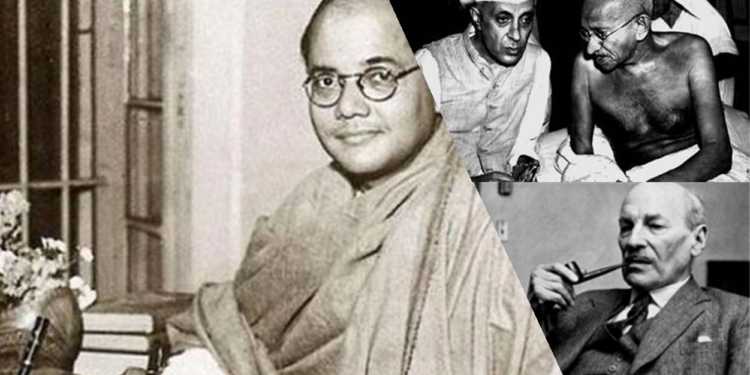During my school days, I used to be extremely excited on 14th November i.e. Children’s day, which happens to be Jawahar Lal Nehru’s birthday too. Almost every school hosts big celebrations on this day. From distributing sweets to mega cultural events, Children’s day is a day of great festivities. The overall effect of the great fervor and festivities on a single day is an everlasting impression on the impressionable mind of a child is that Nehru was a flamboyant, charismatic, and a great leader.
By the end of our school life, we all ended up finishing the structured revision of Indian history either out of curiosity or simply because we were obligated to. But the problem here is that we are academically raised in a manner where the probability of asking critical questions concerning History is nil, nada, zilch!
One of the biggest questions from Indian History is the enigma called Neta Ji Subhash Chandra Bose.
Honestly speaking, there are no mega fests like Children’s Day or Gandhi Jayanti to celebrate Neta Ji’s birthday. Many of us hardly have any idea about Neta Ji’s life and times except for the fact that his death still remains a mystery.
Does that mean Neta Ji Subhash Chandra Bose had no role to play in the freedom struggle of India?
Well! Absolutely not.
There is 1 Incident that excellently illustrates the effect of Subhash Chandra Bose on Indian Independence Movement as compared to Nehru and Gandhi.
When British Prime Minister Clement Attlee who officially signed India’s independence document came to India in the year 1956, he was asked a seemingly simple question by one Justice Chakraborty.
“You won the world war II, you became permanent member of UNSC, you handled the Quit India movement quite well then what made you leave India?”
To which he answered, and I quote.
“Apart from the fact that India became a liability to us, the answer in three words is SUBHASH CHANDRA BOSE and INDIAN NATIONAL ARMY.”
To which Justice Chakraborty asked another question.
“So, what was the impact of Congress and Mr. Gandhi on your decision of leaving India?”
Justice Chakraborty in his book says – that to my question, Clement Attlee while sipping his coffee with an arrogant smile on his face replied “MINIMAL”.
I’m not judging Gandhiji’s efforts here, but the point I’m trying to make is that no country in the world has ever got liberation just by fasting. There were many other countries that got freedom around that time, most of them achieved freedom through armed struggle.
How much Britisher cared about Gandhiji’s fasting is clear from Churchill’s response to Bengal famine. When he was asked about the starving people of Bengal, his only response was “So why hasn’t Gandhi died yet?”
Neta Ji Subhash Chandra Bose had a clear vision and well cut out goals for the independence, while Congress elites like Nehru were busy demanding Home Rule, Neta Ji reiterated Bal Gangadhar’s idea of Complete Independence – Swarajya. He clearly expressed that if you want your enemy to fear you then you must build an Army to deal with an enemy with an Iron Fist.
Neta Ji demanded that instead of asking Indian soldiers to fight for the British in the World War II, if they choose to fight for India, British stand to lose and hence will be compelled obliged to flee back. He believed that the second world war present Indians with a great opportune moment to hit Britisher hard as they were weak and vulnerable.
But Congress back then had no such assertive plans. Instead, they decided to urge Indian soldiers to fight for the British in both versions of the World War. They were hoping that in return of India’s loyalty, British will grant them independence. Wishful and Foolish!
British returned the favour by indiscriminately shooting at peaceful crowd in Jallianwala Bagh, exactly after five months of the World War 1 on April 13. British killed thousands of innocent civilians in Jallianwala Bagh of Amritsar. Amritsar, ironically was the place which contributed the maximum number of personnel in the world war I.
And Jallianwala is no lone exception, the British History in India is replete with countless tales of barbarism. To expect them to free us just like that was Nehru and Gandhi’s senseless romanticism at its best.
Due to internal bickering, Neta Ji Subhash Chandra Bose left Congress, went to Japan and formed Indian National Army with the help of prisoners of war and led the crusade to hit British hard with the help of their Axis enemy so that that they are obliged to flee. In one of their wars against the British, 26,000 out of 60,000 their soldiers, got martyred. Despite 50% fatal casualties, INA did not lose the ground. It managed to drive the British out.
Netaji’s plans of capturing India from the east couldn’t bear fruition because of many reasons one of which was Congress’s hostility towards him. Expectedly, Congress still nurtures the same hositility towards him. The Congress after Independence systematically removed Neta Ji Subhash Chandra Bose from India’s History. Today you will hardly find Neta Ji in the conventional academic history books and there are very few places named after him. Even after 71 years of independence, none of the governments could manage to confer Bharat Ratna, India’s highest civilian award upon Neta Ji Subhash Chandra Bose Bharat Ratna, a laurel which he rightly deserved.



























